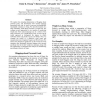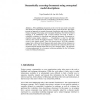168 search results - page 3 / 34 » User biased document language modelling |
123
Voted
CIKM
2009
Springer
15 years 9 months ago
2009
Springer
No search engine is perfect. A typical type of imperfection is the preference misalignment between search engines and end users, e.g., from time to time, web users skip higherrank...
133
Voted
ICWSM
2008
15 years 4 months ago
2008
We explore the emerging phenomenon of blogging about personal goals, and demonstrate how natural language processing tools can be used to uncover psychologically meaningful constr...
116
Voted
ER
1999
Springer
15 years 7 months ago
1999
Springer
. When publishing documents on the web, the user needs to describe and classify her documents for the benefit of later retrieval and use. This paper presents an approach to semanti...
108
Voted
SPIRE
2010
Springer
15 years 1 months ago
2010
Springer
The retrieval of similar documents in the Web from a given document is different in many aspects from information retrieval based on queries generated by regular search engine use...
115
click to vote
AAMAS
2002
Springer
15 years 2 months ago
2002
Springer
Abstract. How and where are the universal features of language specified? We consider language users as situated agents acting as conduits for the cultural transmission of language...


